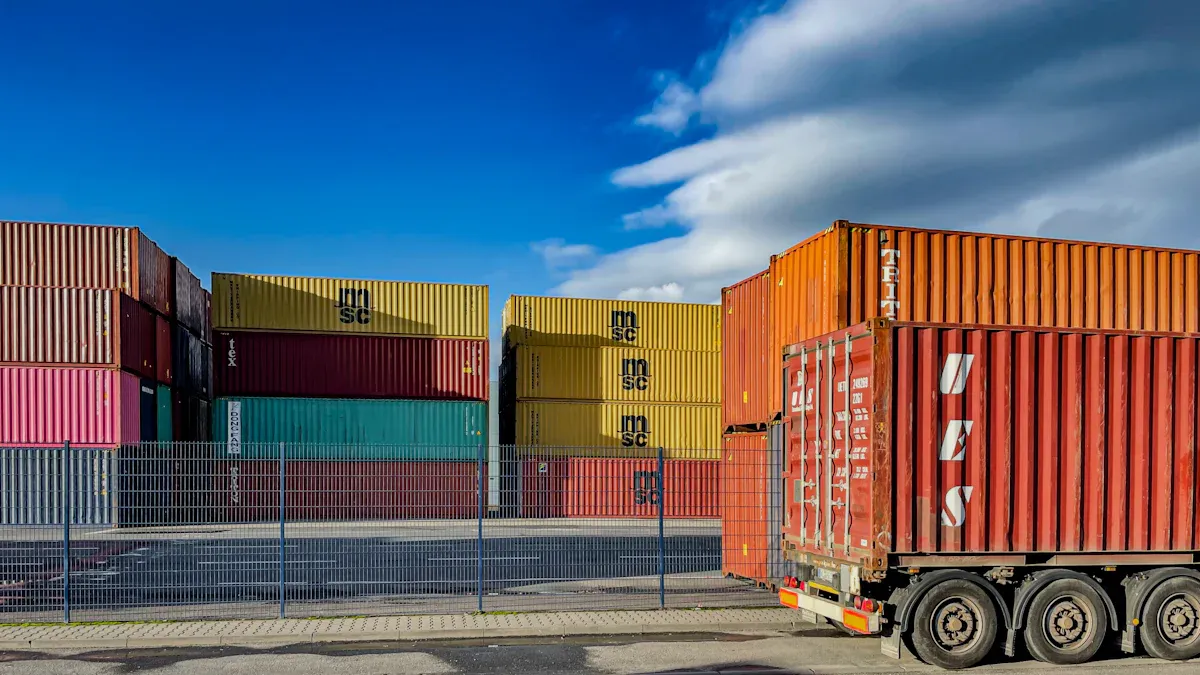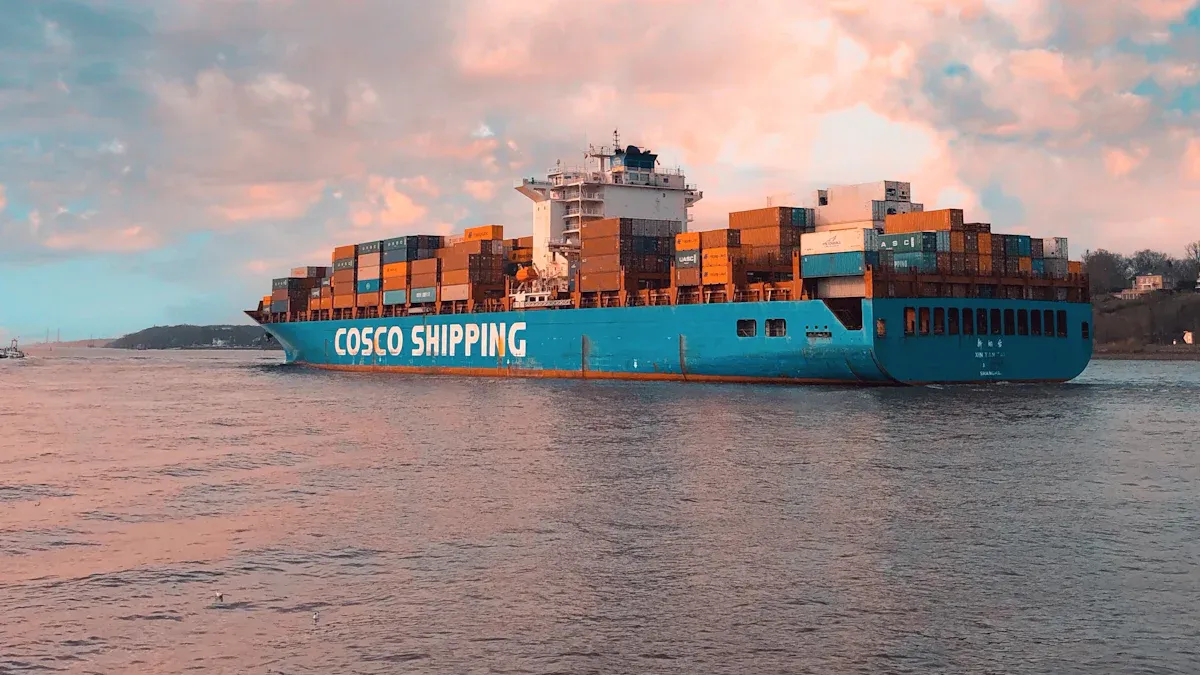Tariff Turmoil and its impact on global automotive supply chains

The global automotive supply chain faces unprecedented challenges due to tariff turmoil. This disruption stems from a 25% levy on imported vehicles and parts, which directly increases costs for manufacturers and consumers. Key impacts include:
A projected 50% chance of prolonged disruptions lasting 16 to 20 weeks.
A 25% tariff affecting 45% of U.S. light-vehicle sales.
Production costs are rising, with $18 billion in investments shifting to North America. Employment patterns are also evolving as companies adapt to these changes. How will these tariffs reshape the automotive industry's future?
Key Takeaways
Tariff problems have made car production more expensive, raising car prices.
Companies are using local suppliers and finding new partners to need fewer imports.
Shipping issues, like longer waits and higher costs, make supply chains harder.
Moving production back to the U.S. is increasing, but there aren't enough workers, and factories need upgrades.
Teamwork and technology help companies handle new trade rules and keep supply chains strong.
Disruptions in Global Automotive Supply Chains

Challenges in sourcing automotive components
The automotive industry faces significant challenges in sourcing components due to tariff turmoil. The 25% tariff on imported auto parts has increased costs for manufacturers. For instance, an engine priced at $5,000 now costs $6,250, adding $1,250 to production expenses. This sharp rise forces manufacturers to reevaluate their sourcing strategies. Many companies are shifting to domestic suppliers or exploring alternative suppliers in countries unaffected by these tariffs.
"Tariff turmoil has created a ripple effect across the supply chain, compelling manufacturers to adapt quickly to avoid production delays and cost overruns."
China's retaliatory tariffs, which have escalated to 145%, further complicate the situation. These tariffs impact critical components like semiconductors and lithium batteries, essential for modern vehicles. As a result, manufacturers must navigate a complex landscape to secure the parts needed for production.
Impact on global manufacturing hubs
Tariff policies are reshaping global manufacturing hubs. Countries like Vietnam and Mexico are emerging as key players in the automotive supply chain. By 2022, Vietnam captured 60% of the U.S. import volume lost by China in categories such as electronics and apparel. Similarly, Mexico became the top exporter to the U.S. in 2023, increasing its share to 15%, while China's share dropped to 14%.
The "China +1" strategy has gained traction, with companies relocating final assembly to countries like Vietnam or Mexico while still sourcing components from China.
European and UK firms are diversifying their supply chains, splitting orders among suppliers in India, Vietnam, and Eastern Europe.
These shifts highlight the global response to tariff turmoil, as companies seek to mitigate risks and reduce dependency on a single region.
Logistical bottlenecks and rising transportation costs
Logistical bottlenecks have become a pressing issue in the automotive sector. Increased waiting times at ports and storage facilities contribute to rising costs. For example:
Storage costs account for 21% of total costs with a one-day wait, 50% with a three-day wait, and 72% with a seven-day wait.
Longer waiting times are necessary to increase load capacity, but this also raises storage and waiting costs.
Transportation costs also show variability. While unit costs decrease with higher loads, they can rise again after a certain point. These fluctuations add another layer of complexity for logistics providers.
The tariff turmoil has exacerbated these challenges, particularly for vehicle imports from Mexico and Canada, which face tariffs as high as 52.5%. Manufacturers must now balance cost efficiency with timely delivery to maintain production schedules.
Reshoring and reduced imports/exports in the automotive sector
The automotive industry is witnessing a shift toward reshoring and reduced imports/exports due to tariff turmoil. Manufacturers are reevaluating their global strategies to mitigate the impact of rising costs and supply chain disruptions.
Reshoring efforts aim to bring production closer to home, particularly in the United States. Tariffs on Chinese components have encouraged reshoring in industries like semiconductors, which are vital for modern vehicles. However, challenges persist. The U.S. lacks the skilled workforce and infrastructure needed to compete immediately with established global hubs. Companies are expanding operations in regions like Taiwan and Japan, suggesting that reshoring efforts may not fully achieve their intended goals.
"Reshoring initiatives highlight the complexities of balancing cost efficiency with supply chain resilience."
The EMS (Electronics Manufacturing Services) industry, which plays a critical role in automotive production, has shown high sensitivity to tariffs. Firms are diversifying their supplier bases and increasing manufacturing in North America to reduce dependency on overseas sources. This trend reflects a broader strategy to adapt to tariff-induced cost structures and logistical challenges.
Higher tariffs have also reshaped global trade dynamics. Firms face increased output costs, which can negatively impact profits. Generous tax credits offered by some governments have provided relief, but competition among firms intensifies when reshoring capacity grows. This competitive environment forces companies to innovate and optimize their operations to remain viable.
The reduction in imports and exports has further altered the automotive landscape. Tariffs as high as 25% have discouraged cross-border trade, prompting manufacturers to focus on regionalized production. While this approach reduces exposure to tariff-related risks, it also limits access to global markets and specialized components.
Reshoring and reduced imports/exports represent a pivotal response to tariff turmoil. These strategies underscore the industry's efforts to adapt to a rapidly changing trade environment while navigating the challenges of cost, workforce, and infrastructure.
Economic and Strategic Implications
Rising production costs and consumer pricing
Tariff turmoil has significantly increased production costs in the automotive industry, leading to higher consumer prices. A 2023 report by the U.S. International Trade Commission revealed that tariffs on over $300 billion of imports reduced reliance on Chinese goods while stimulating domestic production. However, these measures have not substantially lowered prices for consumers.
The Economic Policy Institute found that tariffs had only a temporary effect on inflation, with no long-term correlation to price levels. Despite this, the U.S. trade deficit in automobile parts reached $93.5 billion in 2024, reflecting the rising costs associated with importing components. Manufacturers have passed these costs onto consumers, with new vehicle prices increasing by thousands of dollars.
"Higher tariffs have reshaped the cost structure of the automotive industry, forcing manufacturers to adapt while consumers bear the financial burden."
The ripple effect of these tariffs extends beyond production costs. Automakers face challenges in maintaining profitability while balancing the need for competitive pricing. This dynamic underscores the complex relationship between trade policies and economic outcomes in the automotive sector.
Job losses and workforce challenges
The automotive industry has experienced mixed outcomes regarding employment due to increased tariffs. While some argue that tariffs could support job growth, data suggests otherwise. Analysis indicates that approximately 27,000 full-time equivalent jobs were lost due to higher tariffs. Rising production costs and decreased export demand have contributed to this decline.
UAW President Shawn Fain offers a contrasting perspective, suggesting that tariffs could catalyze domestic job creation. He believes underutilized manufacturing facilities could benefit from increased demand for locally produced components. However, this optimism clashes with widespread concerns about the negative impact of tariffs on vehicle prices and automaker profits.
"Tariffs have created a paradox in the automotive workforce, with potential job growth offset by significant losses in other areas."
The workforce challenges extend beyond job numbers. Companies face difficulties in recruiting skilled labor to meet the demands of reshoring initiatives. This shortage of expertise hampers efforts to expand domestic production, highlighting the need for targeted investments in workforce development.
Geopolitical reactions from key regions
Tariff turmoil has triggered significant geopolitical reactions, particularly in regions heavily involved in automotive supply chains. Countries have responded by implementing trade controls and seeking certifications under new agreements to mitigate tariff exposure.
Businesses have adapted by diversifying their supply chains, exploring partnerships in low-tariff regions like Mexico and Vietnam.
The automotive industry, with its complex supply chains, faces uneven impacts from tariffs depending on the car model and origin of components.
Governments have offered tax credits and incentives to support domestic production, further influencing global trade dynamics.
These geopolitical shifts underscore the interconnected nature of the automotive industry. As tariffs reshape trade relationships, manufacturers must navigate a rapidly changing landscape to maintain competitiveness.
"The global response to tariff turmoil highlights the delicate balance between protecting domestic industries and fostering international collaboration."
The automotive sector's ability to adapt to these geopolitical challenges will determine its resilience in the face of ongoing trade disruptions.
Industry Countermeasures to Tariff Turmoil

Adjusting production lines and diversifying supply chains
Automotive manufacturers have adopted various strategies to adjust production lines and diversify supply chains in response to tariff turmoil. Short-term measures include reallocating orders among suppliers to minimize disruptions. Mid-term strategies involve renegotiating supply agreements and altering production footprints to offset rising costs. Long-term solutions focus on investing in domestic capacity, such as building new plants or relocating production lines to regions with lower tariff exposure.
These adjustments reflect the industry's proactive approach to maintaining operational efficiency while navigating the complexities of global trade policies.
Exploring alternative sourcing and supplier partnerships
Exploring alternative sourcing and establishing new supplier partnerships has proven effective in mitigating tariff-related challenges. Organizations achieve real-time visibility into procurement spending, enabling them to identify cost risks before tariffs take effect. Rapid integration with alternative suppliers ensures smooth transitions across sourcing regions. Supply chain financing solutions provide emerging suppliers with access to working capital, enhancing reliability.
Predictive analytics and AI-driven insights help manufacturers anticipate disruptions and optimize sourcing strategies.
These measures allow companies to adapt quickly to changing market conditions, ensuring continuity in production and minimizing the impact of tariff turmoil. By diversifying supplier bases and leveraging technology, manufacturers strengthen their supply chains against future uncertainties.
Strategic pivot to NEV (New Energy Vehicle) production
Tariff pressures have accelerated the automotive industry's pivot toward New Energy Vehicle (NEV) production. Proposed tariffs significantly impact integrated industries like automotive manufacturing, including EVs. This shift aligns with government policies promoting green technology and reshoring manufacturing. Increased domestic production of EVs reduces dependency on imported components, which are subject to high tariffs.
"The strategic pivot to NEVs represents an opportunity for manufacturers to innovate while addressing tariff challenges."
This transition not only supports environmental goals but also enhances supply chain resilience. By focusing on NEV production, automakers position themselves to thrive in a market increasingly shaped by sustainability and technological advancements.
Leveraging technology to reduce tariff-related dependencies
Technological advancements play a crucial role in reducing dependencies caused by tariff turmoil. Manufacturers increasingly rely on innovative solutions to adapt to shifting trade policies and maintain operational efficiency. These technologies help businesses diversify supply chains, optimize sourcing strategies, and reduce reliance on regions heavily impacted by tariffs.
One significant development is the use of predictive analytics and artificial intelligence (AI). These tools enable manufacturers to anticipate disruptions and identify alternative suppliers before tariffs take effect. AI-driven insights provide real-time visibility into procurement spending, allowing companies to mitigate risks and streamline operations. For example, predictive models can forecast potential bottlenecks in supply chains, ensuring timely adjustments to sourcing plans.
Automation also contributes to reducing tariff-related dependencies. Automated systems enhance production efficiency and reduce reliance on imported components. Robotics and advanced manufacturing technologies enable companies to produce high-quality parts locally, minimizing exposure to tariffs. This shift not only lowers costs but also strengthens supply chain resilience.
The impact of these advancements can be summarized as follows:
Impact Type | Description |
|---|---|
Section 301 tariffs have led to a decrease in imports from China. | |
Increase in Alternate Imports | There has been an increase in imports from U.S. allies and partners. |
Support for Supply Chain Diversification | Tariffs have encouraged businesses to diversify their supply chains, reducing reliance on China. |
These trends highlight the importance of leveraging technology to navigate the complexities of global trade. By adopting innovative solutions, manufacturers can reduce dependencies and maintain competitiveness in a challenging environment.
"Technology is not just a tool; it is a strategic asset that empowers businesses to adapt to tariff turmoil and thrive in a dynamic market."
As the automotive industry continues to evolve, the integration of technology will remain a cornerstone of its resilience and growth.
Tariff turmoil has reshaped the global automotive supply chain, creating challenges that extend beyond increased costs. Disruptions include logistical inefficiencies, skilled labor shortages, and geopolitical shifts. Companies like Bosch and CFMOTO have responded by relocating production to regions with lower tariff exposure, showcasing the importance of proactive strategies.
Strategic collaborations among industry leaders have proven effective in reducing cross-border disruptions. Enhanced visibility and planning have helped manufacturers adapt to changing trade dynamics. Governments must also play a role by implementing balanced trade policies. Higher input costs threaten the competitiveness of the U.S. automotive sector, as noted by Joseph Webster, who warns of diminished performance against international rivals.
"Balanced trade policies are essential for fostering industry stability and ensuring long-term growth."
The automotive industry’s resilience depends on collaboration, innovation, and supportive trade regulations. These measures will help mitigate future disruptions and sustain global competitiveness.
FAQ
What is tariff turmoil in the automotive industry?
Tariff turmoil refers to the disruption caused by increased taxes on imported vehicles and parts. These tariffs raise production costs, alter supply chains, and impact global trade dynamics. Manufacturers face challenges in sourcing components and maintaining competitive pricing.
How do tariffs affect vehicle prices?
Tariffs increase production costs, which manufacturers pass on to consumers. For example, a 25% tariff on imported parts can raise vehicle prices by thousands of dollars. Imported models often see higher price hikes compared to domestically produced vehicles.
Why are manufacturers reshoring production?
Manufacturers reshore production to reduce dependency on imports and avoid high tariffs. Reshoring also strengthens supply chain resilience and supports domestic industries. However, challenges like workforce shortages and infrastructure limitations complicate this transition.
How do tariffs influence global trade relationships?
Tariffs reshape trade relationships by encouraging countries to diversify supply chains and reduce reliance on specific regions. Nations like Mexico and Vietnam have become key players in the automotive supply chain, benefiting from shifts in manufacturing hubs.
What role does technology play in mitigating tariff impacts?
Technology helps manufacturers adapt to tariff challenges. Predictive analytics and AI optimize sourcing strategies and identify alternative suppliers. Automation reduces reliance on imported components, enhancing local production efficiency and supply chain resilience.
See Also
Maximizing Your Automotive Supply Chain's Hidden Capabilities
Expert Advice for Overcoming Automotive Supply Chain Hurdles
Understanding Inflation's Impact on Supply Chain Challenges
